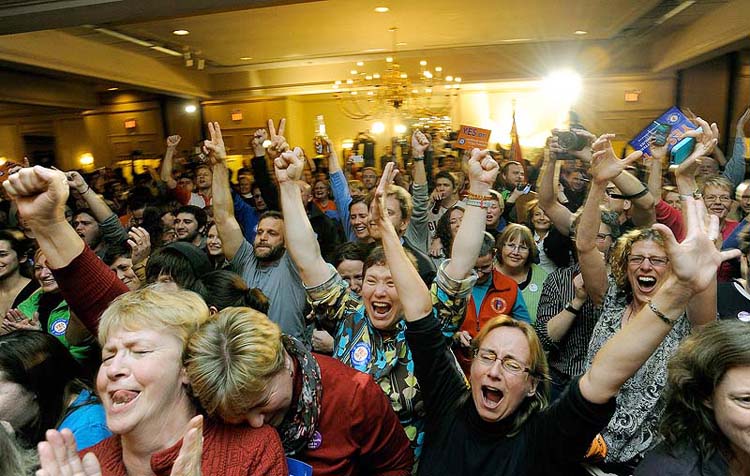Maryland joined Maine Tuesday as the first states to approve same-sex marriage by popular vote, capping a tough struggle by supporters that has lasted more than a year.
The close vote means the unions will begin Jan. 1 in the state.
Gov. Martin O’Malley pushed for the legislation that had stalled in the Maryland General Assembly. He successfully pushed it through, but opponents petitioned the law to be decided by ballot Question 6. Supporters Tuesday were finally able to cheer with finality.
“I think it says a lot about the goodness of the people of our state, and I think it says a lot about the way that we cherish our diversity as a strength,” O’Malley, a Democrat, said in an interview. “We understand in Maryland that we’re all in this together.”
With 97 percent of precincts reporting, the ballot question received 52 percent of the vote. The passage in Maryland and Maine came after 32 states voted against it in past elections.
Supports cheered, danced hugged and popped balloons in celebration.
Christopher Wold, 31, danced with his partner of four years after the referendum was assured. He said they would like to marry now that it’s legal in the state.
“It’s a legitimization of our relationship,” Wold said. “It feels so good to be accepted by so many people of all different backgrounds — like races, religion, everything. It just feels wonderful.”
At the polls, supporters said the ballot question was a major motivator to vote.
“It kind of reminds me of the civil rights movement,” said Cheryl Klam, a 50-year-old Annapolis resident who voted for the ballot question. “I felt it was my civic duty to leave the kids at home and come here and vote for it.”
It was an easy “No” vote for 70-year-old Robert Coleman, a Republican who cited religious reasons for opposing it.
“Raised a Catholic and just don’t believe in it,” Coleman said in Annapolis.
Some Republicans, particularly younger ones, didn’t have trouble voting for it.
Joseph Neat, a 29-year-old registered Republican from Hagerstown, said he has gay friends and voted in favor of allowing them to marry in Maryland.
“Do what you want,” Neat said. “It’s not like as if it’s bothering me.”
Younger voters were more likely to support the ballot question, according to exit polling. The strongest support was among those under age 29, with less support from those age 30 to 44. People over the age of 65 largely opposed it.
O’Malley, who strongly supported the law, has said it protects the religious beliefs of clergymen who oppose same-sex union because they do not have to solemnize the marriages. It’s proved a tough sell, though, among some black clergy and their congregations.
Some Maryland Catholics, though, said they voted for the ballot question, despite opposition from the church.
And although many black church groups opposed the measure, exit polls found that black voters were about split on the issue. White Marylanders voted slightly in favor of the question.
John Raffensparger Jr., 46, a registered Republican, said he voted against it because “it’s a sin against God.”
“It says right in the Bible, ‘Man shall not lie with man like he does with woman.’ That’s just my beliefs. I believe man and woman should be married, but I don’t believe a man and a man or a woman and a woman.”
Send questions/comments to the editors.



Comments are no longer available on this story